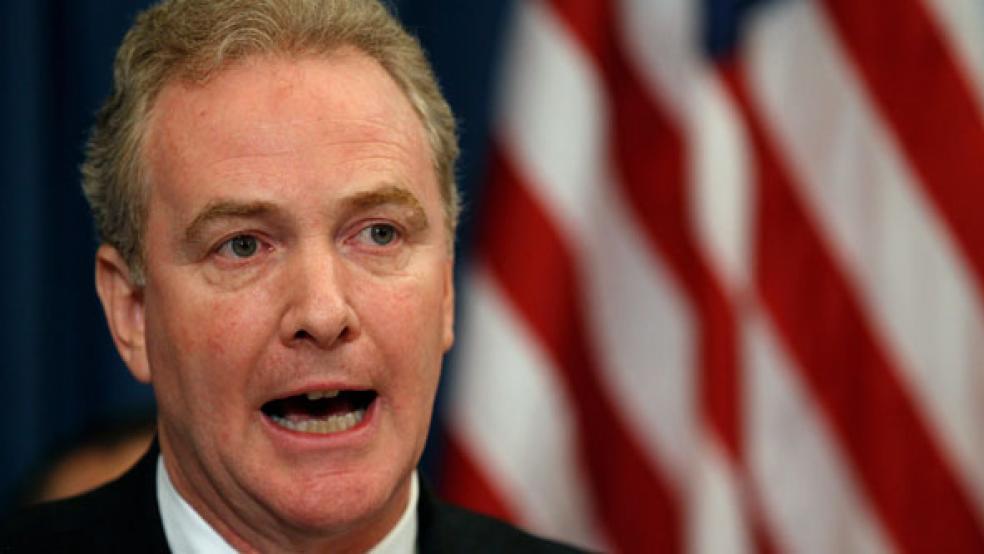When Republican Speaker of the House John Boehner congratulated President Obama on his election victory last week, pundits and policymakers parsed every phrase in search of crack in the armor on the GOP’s no tax increase position.

“We want you to lead,” Boehner said. Let’s find the common ground that has eluded us…. We’re closer than we think to the critical mass needed legislatively to get tax reform done.”
Democrats including Rep. Chris Van Hollen of Maryland say they like the tune, but they want to hear the lyrics on whether the GOP can be persuaded to raise tax revenues on the wealthiest 2 percent of Americans, as President Obama favors, or eliminate hundreds of billions of dollars worth of popular tax deductions or loopholes as part of a compromise to avoid the fiscal cliff at the end of the year. He was dismissive of what he called Republican “pixie dust theory” -- that the government could grow its way out of a deficit crisis with tax cuts that spur GDP growth.
Van Hollen, the ranking Democrat on the House Budget Committee, will be a player in budget and tax negotiations beginning to unfold this week as Congress returns today for a lame duck session following Obama’s reelection victory and a strong Democratic showing in Senate races. In an interview Monday night with The Fiscal Times as Congress was returning for the lame duck session that began today, he expressed disdain for what he called Republican “pixie dust theory” that the government could grow its way out of its deficit crisis with tax cuts that spur GDP growth.
All sides do agree something must be done before the end of the year to avert a fiscal calamity of more than $600 billion worth of tax increases and cuts in defense and domestic programs, or “sequestration,” that will automatically take effect Jan. 2.
Van Hollen said that Republicans hold the keys to whether a deal is cut this year. What the president said is we should extend tax relief for 98 percent of American people, and I think if the Republicans decide to drive off the fiscal cliff and tell the American people that nobody in the country gets tax relief until the top two percent get a bonus tax break, they’re going to have a hard time explaining their position.”
Here are other highlights of an interview with Van Hollen:
The Fiscal Times (TFT): What should we expect to see happen this week on the fiscal cliff -- a touching of the glove, or serious negotiations between President Obama and congressional leaders?
Sen. Chris Van Hollen (CVH): You’ve got a lot of people thinking about different alternatives, but I’ m not sure to what extent everyone is engaged in terms of exchanging ideas. The president has invited the top four members of the Congressional leadership to the White House on Friday. So that will be the formal kickoff. Between now and then, people are giving a lot of thought to different alternatives.
TFT: You’ve said you applaud House Speaker John Boehner’s tone [of his remarks late last week suggesting potential compromise on higher tax revenues], but you’re not sure he’s saying anything different than what Republicans have said before. Expand on that.
CVH: The tone speaks for itself. He sounded like he wanted to work with the president and Democrats to get things done. On the substance, his words were interpreted differently by different groups. It’s the only way to explain [anti-tax advocate] Grover Norquist . . . supporting the Speaker’s statement and that’s because he interpreted the Speaker’s statement to mean that revenue would be generated from the pixie-dust theory that [tax cuts and the elimination of some tax deductions] will grow the economy without increasing the deficit. [Norquist made it clear that] if any of the limitations on tax expenditures were directly used to reduce the deficit, then that would be a violation of his [no tax increase] pledge.”
Q. I take it there’s no chance you and the Democrats would go along with any form of “dynamic scoring” on reaching an agreement on long term revenues.
A. What we support is the professional, non partisan analysis done by the Joint Tax Committee and the budget professionals at the Congressional Budget Office. They’re the referees on these things. Otherwise people just make up their own numbers. The Speaker’s statement the other day was artfully done so that different people could interpret it differently.
Q. How do you see things playing out over the next few weeks? Will we avoid the fiscal cliff or go over it? Will Congress and the administration reach fundamental agreements on a broad range of budget and tax policies or kick the can down the road?
A. Well, I think, when it comes to the sequester, we’ll find an alternative set of budget savings -- whether it’s for a short period of time or a long period of time. In other words, I don’t think we’ll just kick the can down the road. I don’t think that. But I think we will find a replacement deficit reduction package.
Q. Finally, who holds more leverage in the negotiations? The president can hold out the threat of all the tax cuts expiring at the end of the year, while Republicans can once again stand in the way of raising the debt ceiling.
A. I think when the Republicans played politics with the debt ceiling last year it backfired. With respect to the tax provisions, this question was a central part of the presidential campaign. There were a lot of things not talked about during the presidential campaign at length, but this was . . . and the exit polls showed that the country strongly supports the idea of shared responsibility when it comes to reducing the deficit and asking the high income earners to pay more to reduce the deficit.





